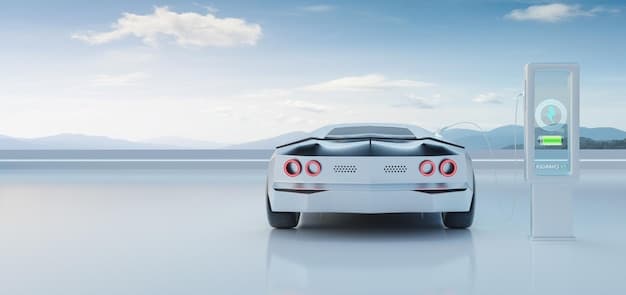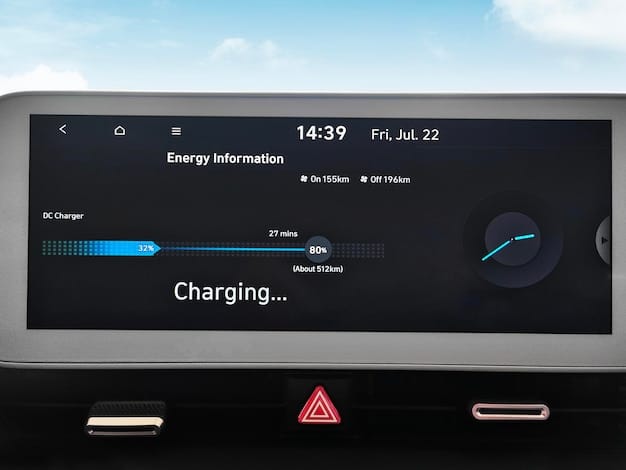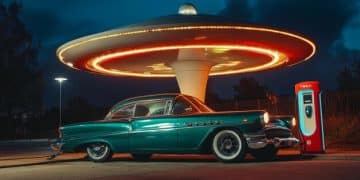Electric Vehicles: Revolutionizing Car Culture in the US

Electric vehicles (EVs) are reshaping car culture in the US, blending sustainability with innovation and altering traditional perceptions of performance, style, and community among car enthusiasts.
The rumble of a V8 engine, the smell of gasoline, the open road – these have long been iconic symbols of car culture in the United States. But as technology advances and environmental consciousness grows, a new player has entered the arena: the impact of electric vehicles on car culture: embracing innovation and sustainability is undeniable, sparking both excitement and debate among enthusiasts.
The rise of electric vehicles in the US
Electric vehicles (EVs) are no longer a niche market; they’re rapidly becoming a mainstream option for American drivers. This surge in popularity is driven by a combination of factors, including government incentives, increasing environmental awareness, and advancements in battery technology that offer longer ranges and faster charging times.
Government incentives and policies
The US government has implemented various incentives to encourage EV adoption, such as tax credits and rebates. These policies aim to make EVs more affordable and accessible to a wider range of consumers.
Environmental awareness and sustainability
As concerns about climate change grow, many Americans are seeking ways to reduce their carbon footprint. Electric vehicles, with their zero tailpipe emissions, offer a compelling solution for environmentally conscious drivers.
The improving battery technology is extending the range of EVs, alleviating range anxiety. Faster charging times are also making EVs more practical for daily use.

The impact of EVs on traditional car culture
Electric vehicles are changing the landscape of what it means to be a car enthusiast. Traditional car culture, with its focus on internal combustion engines and customization, is adapting to embrace electric technology.
Here are some key ways EVs are impacting traditional car culture:
- Performance: EVs offer instant torque and impressive acceleration, challenging the notion that electric cars are slow or boring.
- Sound: The quiet operation of EVs is a stark contrast to the roaring engines of traditional cars, leading to debates about the importance of engine noise in the driving experience.
- Customization: While EVs lack the same level of engine customization as traditional cars, enthusiasts are finding new ways to personalize their vehicles through modifications to suspension, wheels, and aesthetics.
- Community: EV owners are forming their own communities, sharing knowledge and experiences related to electric vehicles.
Electric vehicles are not just a mode of transportation; they are a technological revolution that is reshaping the way we think about cars and driving.
Performance and handling: redefining driving experience
One of the most significant ways electric vehicles are impacting car culture is by redefining the driving experience. EVs offer a unique combination of performance and handling that has captured the attention of enthusiasts and everyday drivers alike.
Instant torque and acceleration
Electric motors deliver instant torque, providing EVs with impressive acceleration capabilities. This instant power makes EVs incredibly responsive and fun to drive.
Lower center of gravity
Electric vehicles often have a lower center of gravity due to the placement of the battery pack, which improves handling and stability. This enables EVs to perform exceptionally well on the road.
Regenerative braking
Regenerative braking not only helps to recharge the battery but also enhances the driving experience by allowing for one-pedal driving. This technology is something that drivers can adapt to easily.

Whether you prefer the thrill of instant acceleration or the precision of enhanced handling, electric vehicles offer a different driving experience that is hard to ignore. As technology continues to evolve, there are certain aspects that make EVs more interesting than cars from prior eras.
The sound of silence: embracing new aesthetics
The absence of a traditional engine sound in electric vehicles has sparked discussions about the aural aspects of the driving experience; however, this has also paved the way for new forms of aesthetic expression.
The quiet revolution
The quiet operation of an EV can be seen as a welcome change from the noise pollution of traditional cars. It provides a more serene and relaxing driving experience.
- Enhanced audio systems: EV manufacturers are focusing on improving in-cabin audio systems to create a more immersive and customizable sound experience.
- Artificial sounds: Some EVs offer the option to add artificial sounds to enhance the driving experience or to alert pedestrians of their presence.
- Design innovation: The lack of a traditional engine has allowed for more freedom in vehicle design, resulting in more aerodynamic and visually striking EVs.
Electric vehicles are not just about what you don’t hear; they’re also about what you do see and feel. The aesthetic possibilities offered by EVs are vast and exciting.
Customization and modification: EV tuning culture
While electric vehicles may not offer the same level of engine customization as traditional cars, a new EV tuning culture is emerging. Owners are finding creative ways to personalize their vehicles, from performance upgrades to aesthetic modifications.
- Software tweaks: EV tuners are developing software modifications that can enhance performance, increase range, and unlock hidden capabilities.
- Aesthetic mods: EV owners are personalizing their vehicles with custom wraps, wheels, and lighting to make them stand out from the crowd.
- Performance upgrades: While engine swaps are not possible, EV tuners are exploring ways to improve suspension, brakes, and aerodynamics to enhance performance.
EV tuning culture is all about pushing the boundaries of what’s possible with electric vehicles. It’s a new form of expression that is helping to shape the future of car culture.
EV communities: building connections
Electric vehicle owners are forming vibrant communities both online and offline. These communities provide a space for enthusiasts to share knowledge, experiences, and a passion for electric vehicles.
Online forums and social media groups
EV owners are connecting through online forums and social media groups, where they can exchange information, ask questions, and share their experiences.
EV car meets and events
EV car meets and events are becoming increasingly popular, providing opportunities for owners to showcase their vehicles, connect with other enthusiasts, and learn about the latest EV technology.
The future of car clubs
Traditional car clubs are beginning to embrace EVs, welcoming electric vehicle owners and incorporating EV-related activities into their events. The presence of classic car clubs is expanding to all types of vehicles today, including EVs.
EV communities are more than just social gatherings; they are a source of support, knowledge, and inspiration for electric vehicle owners. As the EV market continues to grow, these communities will play an increasingly important role in shaping car culture.
Sustainability and ethical considerations
Electric vehicles are often touted as a sustainable alternative to traditional cars, but it’s important to consider the ethical and environmental implications of EV production and disposal.
Battery production and raw materials
The production of EV batteries requires raw materials such as lithium, cobalt, and nickel, which are often mined in environmentally sensitive areas.
End-of-life battery management
The proper disposal and recycling of EV batteries is crucial to minimizing environmental impact. Efforts are being made to develop sustainable battery recycling processes.
By addressing these sustainability and ethical considerations, we can ensure that the transition to electric vehicles is a responsible and environmentally friendly one. Considering the current market climate, EVs stand out among the rest in terms of sustainability.
| Key Point | Brief Description |
|---|---|
| ⚡️ Instant Torque | EVs deliver immediate power, enhancing the driving experience. |
| 🌿 Sustainability | EVs reduce carbon emissions, contributing to environmental protection. |
| 🧑🤝🧑 EV Communities | Owners connect, share knowledge, and drive cultural shifts. |
| 🛠️ Customization | New tuning cultures emerge as customization options evolve. |
Frequently Asked Questions
▼
EVs redefine performance with instant torque, alter sound aesthetics, and foster new customization trends within the automotive community.
▼
While offering lower emissions during operation, battery production raises concerns about raw material sourcing and end-of-life recycling practices.
▼
EV communities are groups of owners sharing insights, experiences, and supporting each other in adopting and enjoying electric vehicles.
▼
Yes, although engine modifications aren’t possible, EVs offer customization opportunities through software tweaks, aesthetic modifications, and performance upgrades.
▼
Government incentives such as tax credits and rebates increase EV affordability and accessibility, promoting widespread adoption and cultural integration.
Conclusion
The impact of electric vehicles on car culture: embracing innovation and sustainability is evident throughout the US. As EVs continue to evolve and become more accessible, they will undoubtedly play a central role in shaping the future of car culture and defining how we connect with our vehicles.





